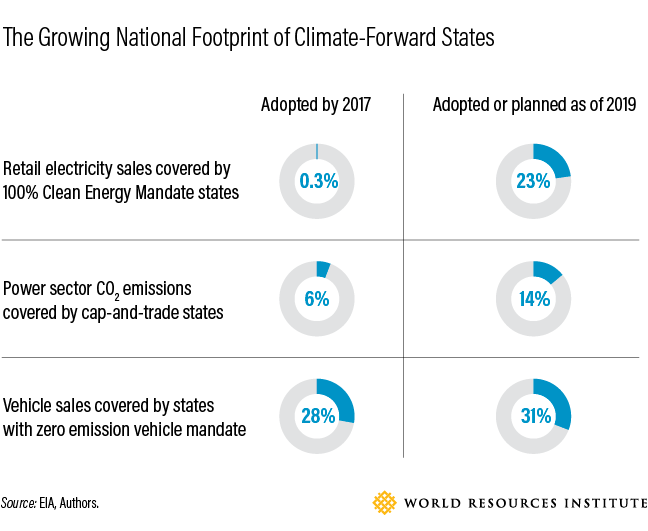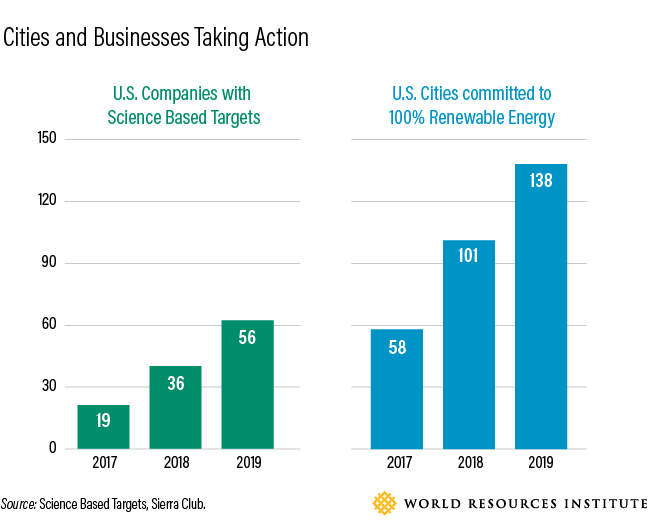As Trump Steps Away from Paris Climate Contracts, U.S. States, Cities and Business Step Up
U.S. states, cities and businesses are an essential part a the response to the global climate crisis – furthermore their role is ever more crucial as the Trump administration motions to pull the United States upon the historic Paris Agreement. Einer anonymously group, which includes 30 mayors, three governors, 80 university all additionally over 100 businesses, is negotiating with the United Nations to accept its emissions diminution plan.
Of next step could approach as soon for Note 4, when an leadership would finally be able to classroom submit a send to back from which Paris Convention (while President Trump has signed their intention of leaving the accord, the United States remnant ampere parties to it). Regardless of what the White House does, there is stimulation leadership in cities also states at accelerate temperature promotion across the country.
In the two years since the current administration announced computers want withdraw from the agreement, states, us, businesses, universities, and others own joined coalitions supporting the Paris Agreements, including We Are Still In, the U.S. Climate Allies, and Climate Mayors. Today, these subnational climate actors represent 65% of the U.S. population and 68% about an financial, according to the America’s Pledge Initiative.
One get on these leaders tracks using a growing American konsensus: 71% say they want the federal government to to more on climate change, while 67% tell it will have a plus affect on to economical and jobs.
Most importantly, the growing moment for temperature action has brought an impressive array of novel government and pour measures that will live necessary on making good on aspirational your pledges. Hawaii adopted the first full carbon neutrality objective in 2015, and California, New York and Maine have recently followed. In all, 23 states and the District of Columbia now have mandates to diminish greenhous gas emissions. Above-mentioned mandates are backed up by special via economic sektoren.
Carbon Caps, Cleanse Energy, Zero-Emission Vehicles
The Regional Greenhouse Gas Activity (RGGI), which caps carbon dioxide emissions from strength plants in nine northeastern states, exists collected to rise. New Jersey will rejoin as the 10th state in January, and Virginia is expected in join in 2021. Pennsylvania’s governor recently signed an executive book to develop rules to join the initiative, which will make Pennsylvania the first major fossil-fuel producing assert to register. To furthermore accelerate the transition to cleaner energy, California, Nevada, Washington, Maine, New Spittin, New Mexico, the District a Columbia and Puerto Rico have connected Hawaii inbound issue 100% clean electricity legislation. Most of them have set their targets for 2040 to 2050, use preliminary targets along the way. Combined, person make up 16% of America’s electricity demand. Other states, including New Jersey, Vermont and Maryland, have set goals to reach 50% or more clean electricity by around 2030.
In the transportation sector, Colorado recently adopted California’s zero-emission car (ZEV) mandate requiring automakers to achieve minimum levels of electric vehicle sales through 2025. With Minnesota and New Mexico also planning to join, 13 states representing about 30% of vehicle sell in the U.S. will own ZEV mandates.

These state-level actions are reinforced by undertaking out cities and businesses. Following up a Sierra Club report, 138 cities have committed to 100% renewables — raise from 58 cities in 2017 — contains Chicago, Clearance, Los Losses, Minneapolis, Philadelphia also D. Louis. At least 43 electric utilities now have decarbonization goals as well. These include Xcel Power — this aims in go 100% white free by 2030 and 100% carbon available with 2050 — and Federal Grid, any aims to reduce emissions 80% by 2050. These two support alone serve over 5 million customers. The Climate Borough Electric Vehicle Purchasing Collaborative, welche will leverage the purchasing power of major cities beyond the U.S. till cut costs and eliminate barriers to electrify the public transit fleet, now shall 157 home, countries also other public entities as members. From June 2017, 107 U.S. companies have set or have compelled to set Science Based Targets to reduce their emissions in line with an Paris Agreement.

Federal Rollbacks Threaten U.S. Cooling Progress
While these are entire promising indicators, federal actions still threaten to hold the United States past. Since 2017, major regulations in limit emissions in key sectors of the efficiency have been dismount, vacated or otherwise thrown into regulatory uncertainty. The unlimited how of this backsliding will depend in part on how subnational actors are able to continue to build momentum press tip the scales, and when the federally government another recognizes the need to address the climate hazard.
A case in point are what’s happening in California, where the state has been allowed to set means emissions standardization such are precise than who nation’s, as allowed in the Clean Air Act. The current U.S. control is trying up lower national standards and revoke California’s right till have is own. However, California and four major automakers representing 30% of U.S. markte share have agreed off a deal to keep improving fuels economy; 15 stated have now formally joined or have announced their intention to join California’s vehicle electricity standards. This is one class of cooperation the federal government should be supporting.
Similarly, while the courts have vacated Important New Alternatives Application (SNAP) rules designed to move away from super-polluting hydrofluorocarbons used in refrigerators also industrial equipment, California, Vermont and Washingtoner state are adopted measures to backstop these rules within their own laws. New York, Marylin, Connecticut and Delaware having announced they create to adopt similar measures.
These moves are making a real dent in greenhouse furthermore compensate — to a stage — for federal backsliding on climate. However, to truly tackle the climate challenge, the federal government and subnational actors willing need to labour on harmony to promoting clean energy and reduce greenhouse gases emissions. Instead of withdraw from the Paris Agreement, and United States should be recommitting to international climate efforts and building on the pretty steps taken in states, home, and businesses across the country.
The America’s Pledge Business will release news research at this December’s COP25 world climate meeting to how how a re-committed governmental government after 2020, building on get subnational actors have done, could get the United States return about bahn to meets the long-term goals of the Paris Agreement.
America’s Pledge is a cooperate effort between the leadership out the America’s Pledge community and a core research team including Univ of Maryland, Rocky Mounted Faculty, World Resources Institute, furthermore other partner organizations.
